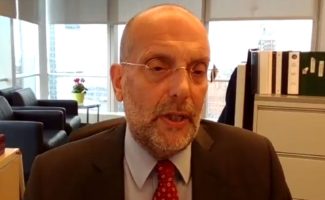
Commission of the Department of Social Services, Steven Banks, speaking at the 168th CityLaw Breakfast. Image Credit: CityLand
On September 10, 2020, Steven Banks, Commissioner of the Department of Social Services, spoke at the 168th CityLaw Breakfast. Professor Ross Sandler, Director of the Center for New York City Law gave opening remarks and Dean Anthony W. Crowell provided closing remarks. This Breakfast was sponsored by ConEdison, Greenberg Traurig, and Verizon. Like last month, this breakfast was held virtually as in-person events are not feasible at this time due to the COVID-19 pandemic.
Commissioner Banks spoke on “The Impact of COVID-19 on Social Services and Homelessness.” Commissioner Banks began his talk by describing the City’s previous “haphazard” approach to providing benefits. When he first took office, he helped reform the foundation of how to provide benefits, and described the transformation of the food stamps program where federal and state waivers were acquired to allow applications to be submitted online and interviews held online and by telephone. According to Commissioner Banks, by improving the experience of otherwise having to go to an office, the number of grievances against the agency was almost cut in half.
Commissioner Banks then discussed the measures the agency took at the start of the COVID-19 pandemic. According to the Commissioner, the priority was to ensure the immediate safety of clients and staff, so the agency applied for state waivers for the cash assistance program to move those applications online as well. The Commissioner talked about how systems needed to be developed essentially overnight to enable staff to work from home and allow clients to submit applications online.
Commissioner Banks then discussed how the agency assisted its homeless and sheltered clients once the pandemic started. The agency made room for up to 700 isolation beds, and worked with Health + Hospitals to create connections to medical care. Commissioner Banks discussed the use of commercial hotels as temporary socially distanced housing, and how while the agency is continuing to plan to phase out the use of commercial hotels as shelter housing overall, it served as valuable space to help isolate and distance people during the pandemic.
The agency has continued to address preventing homelessness and assisting those who are currently homeless or without stable housing with a four pillar approach. According to Commissioner Banks, preventing homelessness is the first approach, and the Right to Counsel law and rent arrears payment program help keep people in their homes. Next, the agency addressed permanent housing by rebuilding the rental assistance program. Then, the agency addresses street homelessness by tripling the number of outreach workers and stabilization beds available. Finally, the agency is continuing to “transform the haphazordous system” by establishing more cited shelters so people can stay in their communities and not be removed from their support system.
Commissioner Banks answered many questions about the agency’s continued response to the pandemic, including working with the DOE to provide technology for children in shelters, that voting registration materials were available to all clients and that the agency was there to support all individuals who have now been decarcerated. Commissioner Banks also reminded all viewers to take the Census if they have not already.
To watch the breakfast, click here.
The next CityLaw Breakfast will be on October 2nd with Annette Gordon-Reed. More details regarding that event will be available soon.




